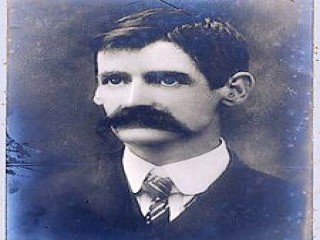
Henry Lawson biography
Date of birth : 1867-06-17
Date of death : 1922-09-02
Birthplace : Grenfell, New South Wales
Nationality : Australian
Category : Famous Figures
Last modified : 2011-06-09
Credited as : Writer and poet, My Army, O, My Army, Short Stories in Prose and Verse
Henry Lawson was born near the gold-mining center of Grenfell, New South Wales, on June 17, 1867, the son of Peter Hertzberg Larsen; the family adopted the name Lawson when the birth was registered. In 1869 his parents took up a small farm.
Having suffered a severe loss of hearing as a lad, Henry Lawson grew up with little education beyond that gained from reading. Bret Harte's stories attracted his interest and influenced him considerably. At 14 he left school and began work. The homesteaders' endless struggle to earn a living from the impoverished land colored the youth's outlook, and his unhappiness was intensified by strained relationships at home. Finally the depredation of droughts in the early 1880s drove the disunited family to Sydney, where young Lawson worked as a house painter. He had developed an ambition to write and at the urging of his mother, Louisa Lawson, began attending night school to further his education. At this point his mother bought out a small journal and trained him to edit it.
In mid-1887 Lawson's first scrap of verse was published by the Bulletin, a radical weekly that had attracted an avid readership among rural workers. Within a few months three more poems were used—one with an editorial note identifying the writer as a youth of "poetic genius." Lawson's first story was accepted late in 1888.
At 22 Lawson began his wanderings about Australia, undertaking various jobs but hankering after journalism. Writing in sympathy with the socialist outlook crystallizing among backcountry workers, he contributed to various workingmen's newspapers (including the Bulletin and the Boomerang) while spending 6 months as an itinerant in the hinterland. Like Joseph Furphy, Lawson was touched by the theories of American social philosophers Edward Bellamy and Henry George, whose books were being carried through the backcountry in the saddlebags of union organizers. A socialist by conviction, Lawson was a proselytizer for organized labor.
In his writings Lawson presented a parade of the archetypes among bush workers. He cataloged special qualities typifying underprivileged itinerants of Australia's sheep-raising areas. A brooding quality is generally present, especially in his verse. The tone of his prose is sometimes sad, but his stories are enriched by the easy humorous humanism of the campfire yarn.
An emergent nationalism tinged with republicanism ran through Lawson's early writings; in this he reflected the determination of colonial Australia in its final phase to create an exemplary nation—as when he wrote, in A Song of the Republic (1887), of the coming nation as being "Free from the wrongs of the North and Past/The Land that belongs to you."
Lawson was a flag bearer of the national literary movement that was emerging from the somewhat earlier folk culture of the inland. Throughout he was obsessed with the struggle faced by the small landowner and the landless underdog, and in writing of life in the hinterland he glorified the concept of mateship, which had been developed by men drawn together in the face of a harsh environment—a code of behavior maximizing unselfish cooperation and minimizing selfish competition. His sketches of poverty-stricken homesteaders, of men in shearing sheds, on the track and around campfires, were in a sense political tracts calling for a fairer deal for the underprivileged.
In 1894 Lawson's Short Stories in Prose and Verse was published by his mother; in spite of some good reviews it failed to sell, but it established Lawson in Sydney's literary circle. In 1896 Lawson married. Success came that year with In the Days When the World Was Wideand While the Billy Boils (mainly a reprint of Bulletin short stories), in which his true talent was revealed. His Pieces Popular and Humorous and a collection of short stories, On the Track and over the Sliprails, both published in 1900, were very well received.
With financial help arranged by the governor of New South Wales, Lawson sailed for London in 1900. On arrival he sold two books; but the environment proved un-congenial, and soon Lawson was drinking heavily. He sold a third book, Children of the Bush, and decided in 1902 to return to Sydney.
The path was easier now, and he wrote and published many short stories and poems over the next 14 years, including My Army, O, My Army (1915); but in fact his best writing had been done in the earlier period.
As his health deteriorated and drink again became a problem, Lawson played out the final years of his life with a small literary pension and an allowance from his publishers. He died on Sept. 2, 1922, and was given a state funeral.
















